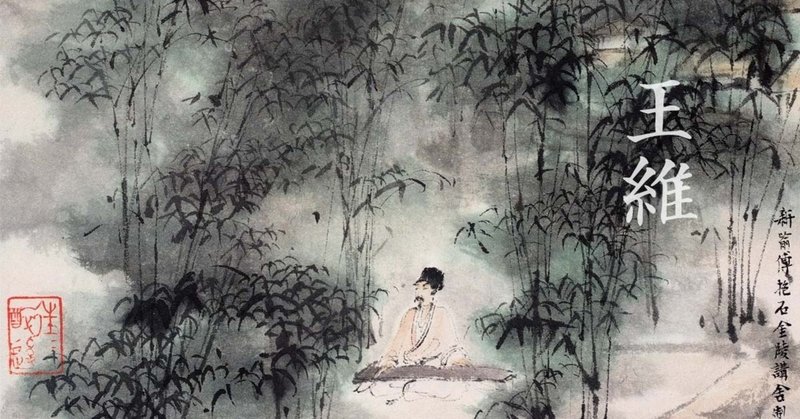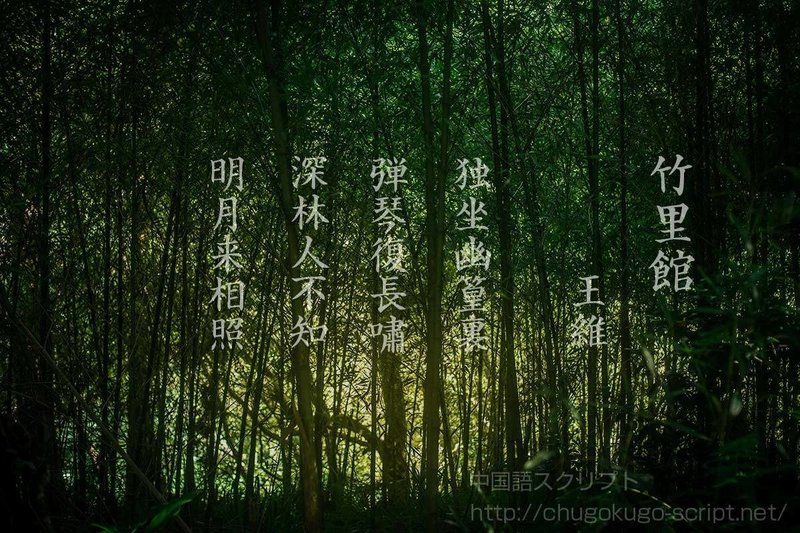
王維の自然詩、"詩中に画あり" Wang Wei's natural poem, "There is a picture in the poem."
中国古典では、"竹"や"月"を題材にした俳諧は多い。それを題材にするようになったのは、中国 唐の時代に画家であり詩人であり政治家であった“王維(おうい)”の自然詩の影響が大きいといっても過言ではない。
In Chinese classics, there are many haiku with "bamboo" and "moon" as the subject. It is no exaggeration to say that the natural poetry of " Wang Wei ", a painter, poet and politician during the Tang Dynasty of China, had a great influence on the subject.
王維の詩の中でも「竹里館(ちくりかん)」は、その代表的なものであり、日本の国語の教科書に紹介されていたくらい有名な五言絶句の詩である。その「竹里館」を紐解いていくと自然詩の情感や情景が見えてくる。
Among the poems of Wang Wei, "Chikurikan" is a typical example, and it is a famous poem with five words that was introduced in Japanese textbooks. As you unravel the “Chikurikan,” you will be able to see the emotions and scenes of natural poetry.
獨坐幽篁裏
彈琴復長嘯
深林人不知
明月來相照
和訳すると、
If you translate into Japanese,
独り坐す幽篁(ゆうこう)の裏(うち)
琴を弾じて復(また)長嘯(ちょうしょう)す
深林人知らず
明月来たりて相照らす
解りやすく説明すると
ただ一人で奥深い竹やぶの中に坐って、
琴を弾いたり、声をひいて詩を吟じたりしている。
この竹林の中の趣は、世間の人は誰も知らないけれども、
天上の明月だけはやって来て、私を照らしてくれる。
という意味になる。
If you explain easily
Sit alone in a deep bamboo bush,
He plays the koto and listens to his voice to examine poems.
No one in the world knows the taste of this bamboo grove,
Only the heavenly moon comes and illuminates me.
煎茶席で、師匠からこの詩を知っていますか、という問いに誰一人として声が上がらない。我々の当時の国語の教科書にも紹介されていたほどの有名な漢詩ですよ。と、言われても反応がない。それなら、いまからでも遅くないので、覚えましょう、と。師匠の後について何度も何度も唱和した。
At the Sencha salon, no one speaks to the master asking if you know this poem. It's a famous Chinese poem that was introduced in our Japanese language textbooks at the time. There is no reaction even if it is said. Then it's not too late, so let's remember. We sang over and over again after our teacher.

王維の自然詩は “詩中に画あり” といわれる作風が多い。詩を読むだけで画が浮かんでくるといわれ、俳諧の創作手本になっている。また、 “画中に詩あり” という逆もいえる。
Many of Wang Wei's natural poems are said to have "there are pictures in the poem." It is said that the picture comes out just by reading the poetry, and it is a model of haiku creation. The opposite is also true: "there is poetry in the picture."
一般的には、独り竹林で琴を奏でるイメージは暗さが先行する。しかしながら、この自然詩にはその暗さや寂しさは微塵も感じられない。自然に同化し、俗の世界から超越したイメージが伝わってくる。
In general, darkness precedes the image of a koto playing by himself. However, the darkness and loneliness of this natural poem is not so slight. An image that transcends the world as it is, assimilated into nature.
王維は自分の世界観をこの短い詩の中で表現している。それが後世に残る詩となっていまに伝え継がれている。この情感が素直に理解できるのはいつのことや、と思いながら夏の夕暮れに煎茶で喉を潤した。
Wang Wei expresses his view of the world in this short poem. It has become a poem that will be passed on to future generations and is still being passed down. Thinking about when I could understand this feeling honestly, I moistened my throat with Sencha at dusk in the summer.
写真は、「王維の詩」の画像から転載。
Photos from "Poem of Wang Wei"
レポート / 渡邉雄二
Reported by Yuji Watanabe
よろしければサポートお願いします。日本の伝統文化に関心を寄せています。若いころに文化圏の異なる地域の方たちとの交流で日本のことをあまりにも知らなかったことに気づかされ、それがきっかけで広く浅く学んでいます。拙いレポートですが、お目に留めていただければ幸です。
